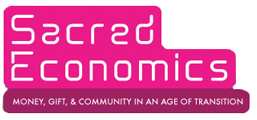
"more for me is less for you. Money then rests on converting the public into the private. Thus we take natural resources, gifts from the earth, and take ownership of them to sell for a profit. Such a system to survive requires continued growth."The principal way of doing so is to begin selling something that was once free. It is to convert forests into timber, music into product, ideas into intellectual property, social reciprocity into paid services. Abetted by technology, the commodification of formerly non-monetary goods and services has accelerated over the last few centuries, to the point today where very little is left outside the money realm. The vast commons, whether of land or of culture, has been cordoned off and sold - all to keep pace with the exponential growth of money... The imperative of perpetual growth implicit in interest-based money is what drives the relentless conversion of life, world, and spirit into money. Completing the vicious circle, the more of life we convert into money, the more we need money to live."
This orientation might have had its uses when humans were few and our needs were limited, but the limits we are facing are requiring different approaches. Eisenstein likens our situation to a child/adolescent who still is largely self-centered. Can we as a human society develop into responsible adulthood where we sacrifice our wants for those we love and could the circle of that love grow bigger as we mature? Optimists believe we can, some think it can happen before we go through more ordeals, others feel only after going through ordeals will we recognize that there must be better ways to organize our relations with one another and the earth.

No comments:
Post a Comment